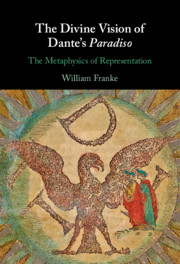Book contents
- The Divine Vision of Dante’s Paradiso
- The Divine Vision of Dante’s Paradiso
- Copyright page
- Contents
- Figures
- Prologue
- Acknowledgments
- Note on Translations and Primary Source Editions
- Part I The Literary Vision
- Part II Philosophical Reflections
- Excursus I Writing and Visionary Immediacy: Mechanics and Mysticism of the Letter
- Excursus II Saussure and the Structuralist Idea of Language as a System of Differences
- Excursus III Temporalization and Transcendence of Time through Language
- Excursus IV Transcendental Reflection: Time Synthesis and the Role of the “I”
- Excursus V Unmanifest Wholeness of Sense: Language as Image of the Imageless
- Excursus VI Transcendentality of Language and the Language of the Other
- Appendix Paradiso XVIII. 70–136
- Index
Excursus III - Temporalization and Transcendence of Time through Language
from Part II - Philosophical Reflections
Published online by Cambridge University Press: 26 August 2021
- The Divine Vision of Dante’s Paradiso
- The Divine Vision of Dante’s Paradiso
- Copyright page
- Contents
- Figures
- Prologue
- Acknowledgments
- Note on Translations and Primary Source Editions
- Part I The Literary Vision
- Part II Philosophical Reflections
- Excursus I Writing and Visionary Immediacy: Mechanics and Mysticism of the Letter
- Excursus II Saussure and the Structuralist Idea of Language as a System of Differences
- Excursus III Temporalization and Transcendence of Time through Language
- Excursus IV Transcendental Reflection: Time Synthesis and the Role of the “I”
- Excursus V Unmanifest Wholeness of Sense: Language as Image of the Imageless
- Excursus VI Transcendentality of Language and the Language of the Other
- Appendix Paradiso XVIII. 70–136
- Index
Summary
Transcendence of time through language is possible because of syntax. Only language can shape time into a whole structure and so image eternity as the indivisible Whole of reality. It is in the achievement of a totality of sense – the meaning of the whole phrase – that the temporality of the phenomenal appearance of its separate parts, the letters, is transcended and an experience of the eternal – God – as an experience essentially of language in its production of meaning is achieved. This experience of the eternal through concrete elements in time is the essence of the Incarnation, which Dante has, in fact, ciphered into the heart of his vision even numerologically, with the thirty-five letters evoking Christ’s life in history up to the acme of the arc of human life and turning thirty-five years old. Christ, as the eternal Word, is the indispensable key to the transcendence of time through language.
Keywords
- Type
- Chapter
- Information
- The Divine Vision of Dante's ParadisoThe Metaphysics of Representation, pp. 206 - 226Publisher: Cambridge University PressPrint publication year: 2021

